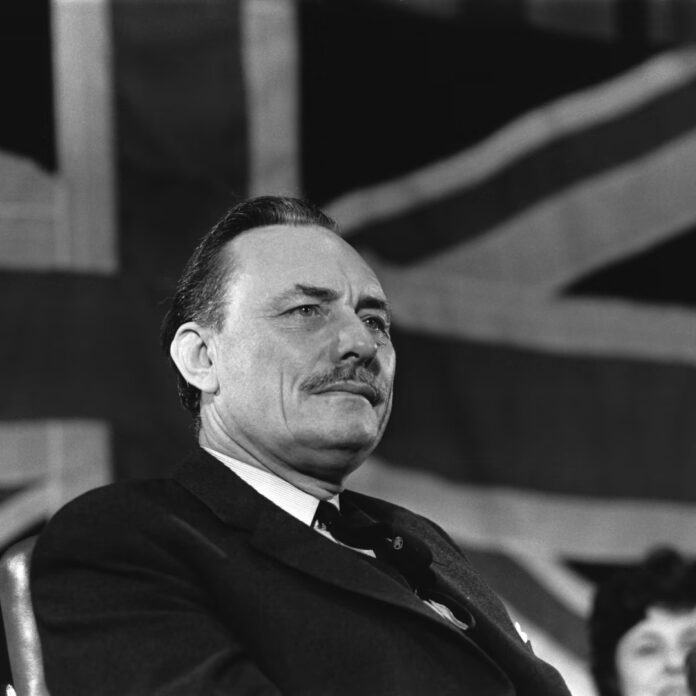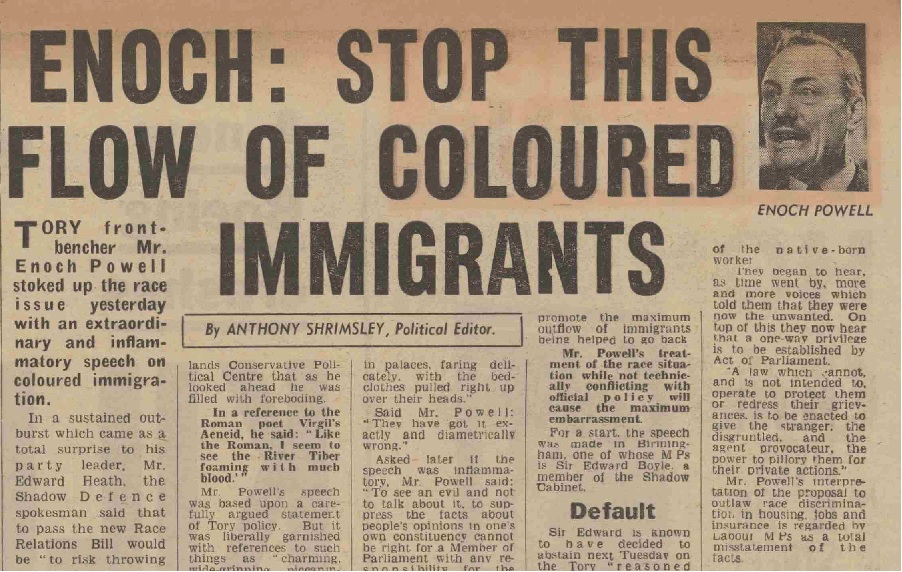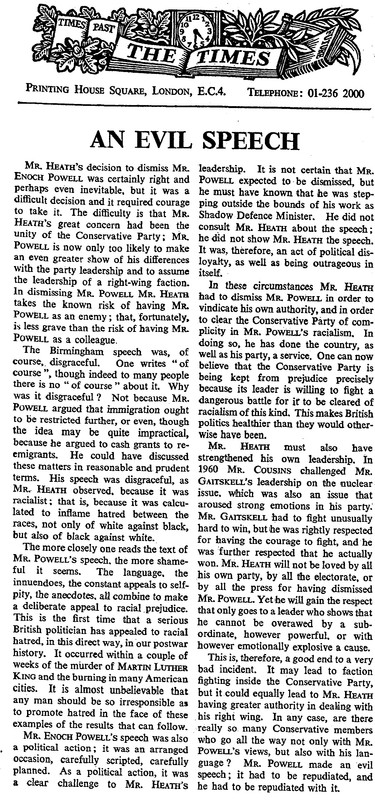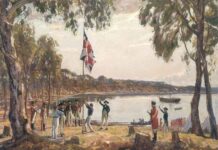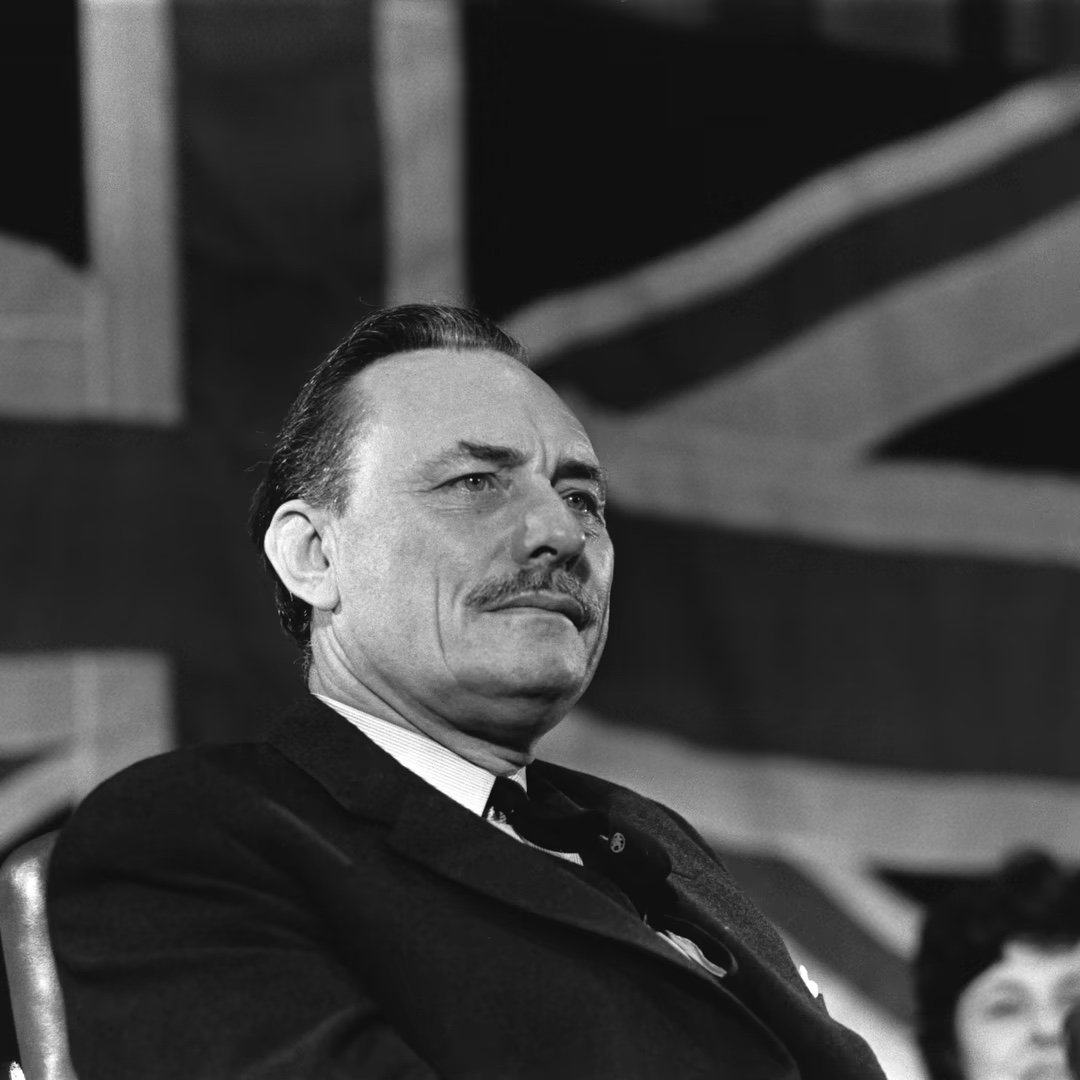 From Patriotic Alternative.
From Patriotic Alternative.
Ben Harrison
We all know about Enoch Powell’s ‘Rivers of Blood’ speech and how it was a lost opportunity to stop us from getting to where we are now. You don’t hear as much about it now as you used to, and that’s a good thing – it was, after all, as close in time to 1913 as to the present day and we need to move on. There was one side to it which I was still curious about though: how was it reported on at the time?
Obviously I’m a fan of Enoch Powell, even though I’m not an uncritical fan of the Rivers of Blood speech because I think some of the language used (“wide-grinning piccaninnies”, “they only know one word of English and that’s ‘racialist’”) etc was unhelpful, though he later said himself that he chose every word very carefully and clearly meant what he said.
The suggestion that the main danger posed by mass immigration was the risk of civil conflict implies that the lack of a race war since then means that you could logically claim that he was wrong and that mass immigration has been a success.
In hindsight, the negative consequences of mass immigration for most White people have turned out to be less dramatic than Powell may have expected but no less serious: the erosion of identity, the loss of a sense of home and our place in the world and a feeling of uncertainty about the future.
One-sided perspective
There’s plenty of material produced by academics about how we were made into a multi-ethnic society, but only ever from a triumphalist, pro-minority perspective.
Polls suggest that a big majority of the British population at the time opposed the large-scale immigration of people who could never truly assimilate but could only ever alter the very DNA of the country and transform it into something else, but most people oppose mass immigration even now so what difference has that ever made?
Since the media is the main instrument used by those who own it to impart their worldview on the general public, the media coverage of the speech is much more useful in getting a sense of which way society was going to go. I was particularly interested to see what arguments were being made and what kind of terms were being used compared to the present day.
Anything post-WW2 is fundamentally still the same era as we live in now far as I’m concerned, but I wasn’t alive in the sixties so don’t have any first-hand experience of how far things had gone by then. Powell did however predict “a chorus of execration” (not a phrase you can imagine many politicians using today!), so I could hazard a guess.
I wanted to look at the TV coverage as well except I had no way of accessing the archives, though you can still get an impression of what it was like by reading these complaints about the BBC taken from the many thousands of letters of support sent to Enoch Powell shortly after making the speech he’s best known for today.
I looked up six different newspapers for the week immediately following the speech, namely 21-27 April 1968: the Daily Mirror, the Guardian, the Times, the Daily Express, the Daily Telegraph and the Daily Mail. I didn’t look up who owned them at the time or who the editors were or anything like that, I just made notes on what I saw.
It’s worth putting the speech into context as well, because it was given a few days before the final debates on the Race Relations Bill. A lot of potential talk about what direction the country should take was therefore overshadowed in the media coverage by talk about whether it was right for the state to legislate on an individual’s right to offer employment or housing to whoever he wishes, and whether the proposed law would be giving an unfair privilege to non-Whites by allowing them to take people to a tribunal if they felt they had been unfairly treated.
Other events in the news at the time included the discussions on how to deal with the white minority government in Rhodesia which had just broken away from British rule as well as the assassination of Martin Luther King, so race was already a hot topic.
It’s also worth pointing out that Powell was then Shadow Defence Secretary and as such his remit did not cover immigration, he did not consult his colleagues beforehand about what he was going to say, and he also made his own arrangements with the media instead of going through the usual Conservative Party channels, sending them copies of the speech in advance so as to generate publicity on his own terms.
The Daily Mirror
The Daily Mirror wasn’t all that different to what you would expect today, written in a tabloid style, and it deliberately chose a photo of Powell which made him look as crazed as possible.
It gave the speech and the public reaction to it plenty of coverage over the week, though there was very little substance to any of it. The main editorial ticked off a lot of buzzwords: “racialism”, “ignorance”, “bigoted”, “extremist”, “Alf Garnett”, and finally an inevitable reference to “Hitler and the evil of anti-Semitism”.
The Mirror was strongly negative towards Powell aside from one surprising article saying that racial prejudice wasn’t a big problem and that Powell spoke for the majority, though this was countered by a different article on the same day saying that the real issue was the economy, and that “raising the racial issue was as biased and unforgivable as Hitler’s trick of blaming the Jews”.
The letters which the Mirror received were supposedly 40 to 1(!) in favour of Powell, though you would never have guessed it from the relatively even split among the ones which they chose to publish.
The kind of arguments being made by letter-writers were generally similar to the ones you would expect today: “glad somebody has finally talked about this delicate issue, because if this isn’t dealt with it may increase support for ‘extreme right wing organisations…’”, “we need immigrants for the NHS”, “I’m ashamed to be British” etc, and then on the other side: “is it so wrong to desire to live among one’s own people?”, “whatever we do to solve this problem will be classed as racial discrimination”, and “we were never asked”.
The Guardian
What struck me first of all was how much longer the articles were than we are used to seeing today and how restrained the article on the front page was the next day – they obviously didn’t realise yet that this was a speech people would still be talking about decades later.
The general reception was unsurprisingly negative, but much more even-handed and far more willing to humanise a political opponent than you would get from the Guardian now. Large chunks of the speech were quoted more or less verbatim and the reader was allowed to make up their own mind about it without any emotive commentary.
There was no hysterical moralising except in some of the letters, and the editorial even denied that Powell intended to “fan the flames of racialism” and acknowledged that immigration causes social problems.
Newspapers at the time seemed to quote a wider range of people than they do now, and the Guardian even uncritically quoted comments made in Parliament by Powellite Conservatives. MP Angus Maude was quoted as saying “British people did not accept that they had got to put up with a permanent racial problem and wanted the danger exorcised before it was too late”… British people “did not want a multi-racial society”.
Funnily enough, the most negative article written about Powell had nothing to do with his speech at all, but about his neoliberal economic policies which nobody remembers now. The general view was that while any kind of prejudice was a bad thing, immigration wasn’t a good thing per se, and that the immigrants being here at all was the responsibility of the Conservatives as the former party of imperialism.
Overall, the coverage was shockingly grown-up and reasonable and felt like a very different Guardian to the one we know now. There were no clickbait articles in the days afterwards saying “haha, we’re coming to take your country and there’s nothing you can do about it”, nobody smugly saying that white people don’t actually exist, no cartoonish allegations of “hate”, no screaming for Powell to be put in prison and the Conservative Party to be proscribed and surprisingly no article about the speech written by an ethnic minority.
The Times
For some reason people seem to think of The Times as a right-wing or conservative newspaper, but even in the 1960s it used the term “racist” or “racialist” 128 times in the year leading up to the Rivers of Blood speech. That’s nothing compared to the 879 times it mentioned either of those two words in the full year 2019 (the most recent year I could find data for), though it still meant getting reminded of the concept of racism roughly once every three days.
The editor wrote a very negative piece about the speech, which was quite similar in tone to what you might expect today and was very buzzword-heavy: “an evil speech”, “promoting hatred”, “disgraceful”, “appeal to racial prejudice”. Though I actually knew about this one already, because the editor’s son Jacob Rees-Mogg felt the need to post the speech on his Twitter account 50 years later saying he agreed with it.
The Times published a lot of letters from Conservative MPs, which are worth highlighting because of how it split opinion within the party. The majority agreed with the decision to sack Powell, with one of them calling his speech “deplorable”, though another referred to racial incompatibility being “one of the more obvious facts of international life”.
A third claimed, though in different terms, that we’d always been multicultural between we had created a union between English, Scottish, Welsh and Northern Irish, and that diversity was our strength.
From reading The Times you get the impression that Powell’s speech was extremely unpopular among the general public instead of the opposite. One article was made up almost entirely of negative quotes from other individuals or organisations, including some of the many ‘anti-racist’ or ethnic advocacy groups which existed even in 1968, some of whom called for Powell to be prosecuted for incitement to racial hatred.
A few articles in different papers raised the possibility of a more hardline party gaining influence if immigration was not kept under control, but the Times was the newspaper which took this idea the furthest. It published an article about the National Front, which had only been formed in the previous year and was said to have been given a boost by Powell’s remarks.
Even though they couldn’t bring themselves to write about a so-called “far-right” party without getting a self-proclaimed “race-relations expert” to give his opinion on them, the coverage they gave the National Front was very matter-of-fact and honest by the standards of today.
So honest, in fact, that they acknowledge that the kind of person who spends their life ‘studying racism’ and who worries about how white people might start supporting organisations that act in the interests of their ethnic group is a Jew who clearly identifies full well with his ethnic group.
To be continued.
From Patriotic Alternative.

